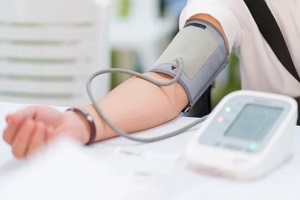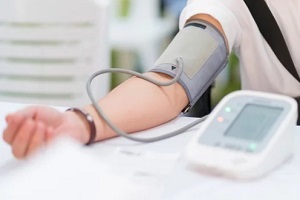 Did you know that recognizing high blood pressure symptoms can potentially save your life? Awareness of the top indicators of elevated blood pressure empowers you to seek treatment and get your levels under control before complications arise.
Did you know that recognizing high blood pressure symptoms can potentially save your life? Awareness of the top indicators of elevated blood pressure empowers you to seek treatment and get your levels under control before complications arise.
This article will explore the ten most significant symptoms that suggest your blood pressure is higher than it should be.
Headaches
One of the most common complaints associated with hypertension is headache pain. Hypertension increases the pressure on blood vessels in your head and neck, which can trigger severe headaches.
In particular, a hypertensive headache may feel similar to a dull, pressing sensation on both sides of the head. The pain can extend from the back of the head and neck to the front. These headaches tend to come on in the morning and subside later in the day.
Don’t assume all headaches are due to high blood pressure. Typical tension headaches cause similar symptoms. But if you don’t usually experience headaches and develop persistent ones combined with other signs on this list, get your doctor to check you out.
Vision Changes
Have you noticed any changes in your sight, such as blurry, double, or vision loss? High blood pressure can injure the tiny arteries supplying the retina at the back of your eye with blood. This is called hypertensive retinopathy.
The retina is responsible for sharp central vision, and damage to its blood vessels causes blurred or spotty vision. Retinal bleeding due to high pressure can also lead to floating spots in your field of vision. Without treatment, you may eventually lose your sight entirely.
Chest Pain
Chest pain or discomfort is a characteristic symptom of several severe heart issues. Since high blood pressure strains your cardiovascular system, it can cause chest pain, known as angina. Angina feels similar to pressure, tightness, burning, or aching in the chest. It may occur with physical exertion or even at rest.
If you have very high blood pressure and experience sudden, crushing chest pain, sweating, nausea, and radiating pain in your arm or jaw, you could be having a hypertensive crisis or heart attack. Call 911 immediately.
Dizziness
 Dizziness is a common effect of elevated blood pressure. When your circulation is impaired, your brain receives less oxygenated blood. This disruption manifests as bouts of lightheadedness, wooziness, or vertigo.
Dizziness is a common effect of elevated blood pressure. When your circulation is impaired, your brain receives less oxygenated blood. This disruption manifests as bouts of lightheadedness, wooziness, or vertigo.
You may feel off balance as if you’re in a spinning room. Dizziness due to hypertension tends to worsen when standing up after being seated. Such episodes signal that something is interfering with normal blood flow.
Fatigue
Feeling wiped out and extremely fatigued is often chalked up to simply getting older or life stresses. But, research shows that high blood pressure and excess fatigue go hand-in-hand. Why? Your cells need oxygen to produce energy.
But when your blood pressure is high, your heart has to put a lot more effort into pushing blood through constricted vessels. This results in full-body oxygen deprivation, leaving you feeling constantly tired and weak.
Flushing
Facial flushing occurs when blood vessels in your face suddenly dilate and become engorged with blood. This reaction appears as reddening or blushing of the cheeks, nose, forehead, and chest. Flushing can happen randomly but is also triggered by stress, sun exposure, spicy foods, alcohol, and hot beverages.
These triggers all raise blood pressure temporarily in those with hypertension. So, if you notice frequent flushing of the face and skin, it could signal an underlying issue of chronically high pressure.
Nosebleeds
Nosebleeds are not super common with high blood pressure. Still, they can happen when delicate nasal blood vessels are damaged and rupture easily. Bleeding from the nostrils tends to occur spontaneously or when blowing your nose.
This symptom links back to the strain hypertension places on arterial tissues. If you don’t usually get nosebleeds but suddenly develop them, evaluate your blood pressure.
Blood in Urine
Blood in your urine, or hematuria, is a serious high blood pressure symptom. When arteries in the kidneys are stressed due to hypertension, they become weak and prone to rupturing and leaking blood into the urinary tract.
You may notice pink, red, or brown urine, sometimes called cola-colored urine. The presence of blood indicates kidney injury and requires prompt medical attention.
Irregular Heartbeat
Over time, the heart has to change its structure and function to push against the high arterial resistance caused by hypertension. These changes abnormally stimulate your heart’s electrical system, which leads to arrhythmia or an irregular heartbeat.
It might seem as if your heart is racing, pounding, or fluttering unpredictably. A sensation of “flip-flopping” in your chest is also common with heart palpitations.
Shortness of Breath
 Difficulty breathing or shortness of breath can arise when high blood pressure congests the lungs with fluid. This pulmonary edema makes it tough to fill your lungs fully, resulting in labored breathing, wheezing, or gasping for air.
Difficulty breathing or shortness of breath can arise when high blood pressure congests the lungs with fluid. This pulmonary edema makes it tough to fill your lungs fully, resulting in labored breathing, wheezing, or gasping for air.
Lying down flat tends to worsen breathlessness. Swollen legs or coughing up frothy, blood-tinged sputum are other signs lungs are congested due to hypertension.
Work with Imperial Center Family to Manage High Blood Pressure
High blood pressure is notorious for showing no obvious symptoms as it damages your health. Don’t wait until you experience an emergency, such as chest pains or blood in your urine, to get your blood pressure screened.
Make regular checks part of your routine care even if you feel fine. If you develop any of these high blood pressure symptoms, don’t ignore them. Get checked out to determine if hypertension is the cause.
Imperial Center Family Medicine’s expert clinicians stay current on the latest research and treatment options for high blood pressure. We partner with you to make lifestyle changes, find the proper medication if needed, and provide ongoing monitoring. Contact us today at 919-873-4437 or online, and let us help reduce your high blood pressure risks.
